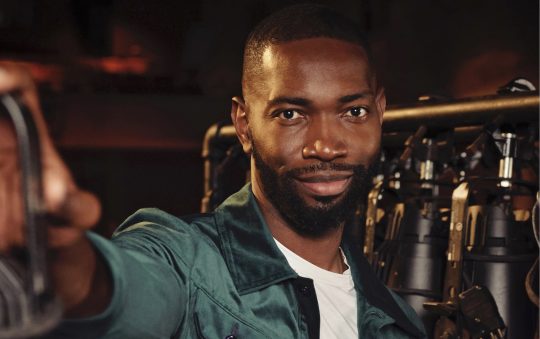
Tarell Alvin McCraney, Academy Award winner and artistic director of Geffen Playhouse, has launched “Black Out Nights” and “Black Partner Appreciation Nights” to attract Black patrons and Black community organizations to the Westwood theater.
“We had a Black Out Night specifically for ‘Brothers Size’ that was intentional around making space for Black folks to gather around this play and we’ve had unintentional Black Out Nights,” explained McCraney.
“They weren’t nights necessarily curated for folks of the Black experience, but the audience was 90% Black on any given preview. Because that space is so intimate we could have moments where we didn’t have to sort of advertise that it was the Black Out Night for it to occur.”
McCraney also said about Black Partners Appreciation Night that “it is a night where we literally give 100% of the proceeds to partners who bring in constituents to see the play.”
Related Stories:
https://lasentinel.net/tarell-alvin-mccraney-brings-the-brothers-size-to-geffen-playhouse.html
https://lasentinel.net/tarell-alvin-mccraney-the-new-artistic-director-of-geffen-playhouse.html
The next Black Partners Appreciation Night will take place around “Furlough’s Paradise.” Black organizations interested in participating in the next Black Partners Appreciation Night can contact the Geffen Theater for more details.
Before “Furlough’s Paradise” opens, Black patrons are always invited to come individually or in groups to see any production. McCraney affirms, “People getting together, their friends to have a day or an afternoon with us. We don’t take that lightly.”
Just as McCraney speaks frequently of “love and kinship” and refers to some collaborators as “cousins” he beckons to our community members, aunties and uncles, who have yet to visit Geffen Playhouse or have not been in a long time: “Come and spend time with us… come and engage with us.”
When asked about his approach to the role of artistic director, McCraney’s said his goal is “to place myself in an act of service and a role of service so that I can be not only in service to this intimate community, but also to be a connection to my peers who are also trying to do the same thing.
“I’m the new cousin to the neighborhood and I get to learn so much about L.A. through the people who have been here, are here, the folks who support Black Theater. You have to know that there are people who’ve been doing it before,” he noted.
“We’re doing work with folks who are formerly incarcerated and doing work with people who are currently incarcerated and system-impacted. And so my main objective is always to (number) one, honor that work. Make sure I’m not treading on anybody else’s, you know, space without at least saying, hey, this is what I’m trying to do. I’m always sort of going, hey, this is what I’m up to… and people go, ‘Oh, here’s a person you should connect to’ so that’s how I know I’m in kinship.”
McCraney shared the highest possible vibrations when asked to mention his creative peers who he also considers “mentors” such as legendary playwright August Wilson. McCraney added that it was likely due to the theater “apparatus” of Wilson’s era, rather than an absence of Black writers like Amiri Baraka. Contrasting that forced antiquated mode of singular success, McCraney remarked, “I feel blessed to be in a sort of cadre of Black artists and writers all the time.”
In terms of leadership in the artistic director space, McCraney is also collaborating across geographies. He cited working with New York Theater Workshop, Steppenwolf, CTG and the Globe Theater to collaboratively ensure that art leaders and audiences alike are in conversation about and producing “necessary work.”
The next production at Geffen Playhouse, “Dragon Lady,” is a musical comedy about “a matriarch not to be trifled with” who tells her life story to her granddaughter through song. He said that the play provides a wonderful opportunity for a day out or evening out with grandparents and multiple generations at the theater.
With so much success around Black Out Nights and Black Partner Appreciation Nights, McCraney is extending the model to other communities. Of his efforts building community McCraney observes, “So far, it’s been met with a kind of love and kinship.”






